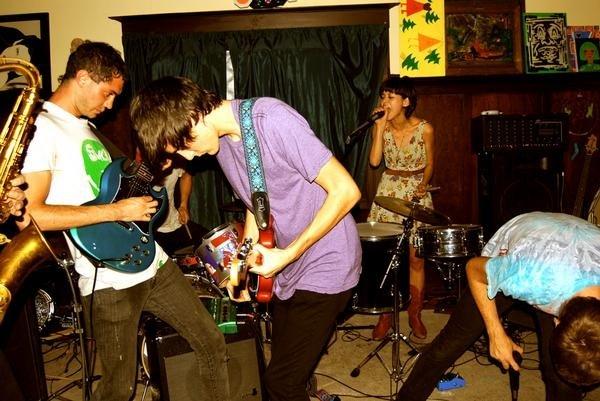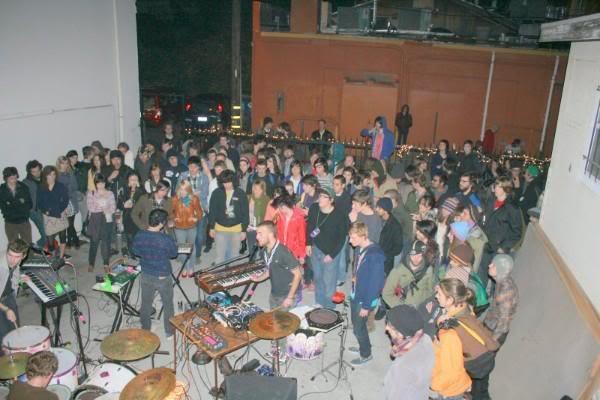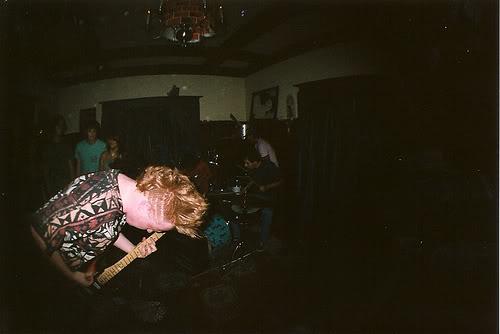Imagine a DIY music scene that activates the numerous shuttered, boarded and barren properties of Sacramento. Not just the ones that blight downtown, but the vacants in Del Paso Heights, in Oak Park and even the abandoned strip malls of south Sacramento. Sure, there’s the en vogue activation of placemaking with installations, art walks, murals and street fests, but this is about fostering the “raw energy” that Mayor Darrell Steinberg proclaimed vital to the city in January.
The mayor is putting aside $500,000 to be distributed in the city’s eight districts. The money is intended to activate arts innovation hubs and programs, but many in the arts community don’t see the funding as an aid if entertainment permit policy demands they hand the money back over to the city.
Mark Kaiser, founder of Mt. St. Mtn. Records, explains the problem. Kaiser sits on the mayor’s Creative Economy Task Force, which consists of roughly 50 local artists, restaurateurs and entrepreneurs providing input on how to distribute the $500,000 appropriation. Kaiser has played in these DIY spaces and once ran 3rd and B, a basement teen center in Davis. His opinion regarding the money is cut and dry: “I don’t think [we] need money. I think [we] need to be left alone.”
By that he means cut out the permits and back off on policy.
Events in Sacramento require an entertainment permit. Permanent venues must be approved for a two-year permit that costs $1,722, the renewal of which is an additional $1,331. In addition, each applicant or co-applicant of the permit must pay $88 per person for fingerprinting. One-time events require a Special Entertainment Permit application, which costs $1,405 plus $88 fingerprinting per individual on the application.
The formal permit program, known as the E-Team (for the Sacramento Police Department’s Entertainment Team), was established in 2003. Program Manager Tina Lee-Vogt paints a depraved picture of Sacramento before the program. “There was improper management, over serving, underage drinking, there were fights. It was just a lot of poorly managed clubs that were draining on the city and police resources.”
Punk bands used to play shows out of a Midtown house circa
2008-2010 until word got out and the police shut them down.
(Photo courtesy Liz Liles)

“The city realized that entertainment was a valuable asset,” she says. “They wanted a vibrant night life, they just wanted it to be better run. They developed the program to have a better-operated entertainment system in the city.”
That system benefits businesses that can afford the permits. But what if all you want to do is book a show for a few local bands that draws 60 people? What if you’re not trying to pack the Golden 1 Center with a Bruno Mars performance and would rather curate a space for teenagers and 20-somethings to experiment and form a band?
The problem is that even when done with the up-to-code accoutrements that exist at the Warehouse Artist Lofts, the organizers still feel cut at the knees by policy. Owner of Old Gold boutique and WAL resident, Trisha Rhomberg has struggled to activate her residence with live music. After warnings from the police about rooftop performances, Rhomberg decided to pursue a two-year permit to launch a rooftop series in 2017. It resulted in a Facebook post on Sept. 2, 2016 lambasting the E-Team’s inadequacy in communication and commitment to timetables set by their website. Shey says her application to hold legal rooftop shows went 75 business days without movement. The entertainment permit instructions say the process will take 45 days. Rhomberg’s post concludes with “enjoy the nonrefundable $1900.”
On Sept. 29, 2016 WAL received its approved two-year permit.
DIY shows in Sacramento used to be “epic” say proponents of the
scene. (Photo courtesy Liz Liles)

“I recently had a long-time business owner tell me that in the ‘90s when the permit became mandatory that killed live music here,” she says, referring to the open dance permit that was instituted prior to the E-Team.
Rhomberg’s issues with policy deepened this February with a folk show that took place in the WAL commons room. Two singer-songwriters from Davis label Crossbills Records performed to 67 people. Conditions of the permit require security ($90), WAL insisted on insurance ($142) and the sound guy discounted his rate to $50, which put the show $282 in the hole before a ticket was sold. The $6 door cover meant that after expenses paid, both singers walked with $60. Rhomberg elected not to pay herself. Again she documented the complaint on Facebook. It drew commentary from many promoters that have either paused their operations or operate in the shadows for the same reasons.
Lee-Vogt insists her department is accommodating. “They are like snowflakes in that they are really unique and designed for each venue,” she says. “So a venue that has an occupancy of 70 people and is doing entertainment occasionally is not going to have the requirements that Ace of Spades does.”
Requiem Events talent buyer Asher Styrsky was among the commenters on Rhomberg’s Facebook post, claiming the fees halted his events. “That’s 30 less international level artists coming to Sac each year,” he wrote.
Requiem Events launched in the summer of 2013 and hosts most of its electronic dance artists at Midtown BarFly on 21st Street. Styrsky’s events don’t just offer the 18 and over crowd a dance spot. An insurance broker by day and father of two, Styrsky curated the events beyond the DJs to include food pop-ups, art installations and choreographed dance performances that made a Requiem event atypical to a night club. He says his team and fans of the event wanted more creative ideas to come to life — like one-time warehouse events in areas set for development, public raves in parks or at public pools, and “dancing in the sun with fellow music lovers.” He wanted to take Requiem out of the BarFly’s dank back room, out of the 10 p.m. to 4 a.m. hours, and into public visibility.
“At each opportunity, we were faced with an overly complicated and expensive permit process or going underground,” Styrsky says. “The math didn’t make sense doing it legit. And we didn’t want to risk an event being shut down or breaking the law by going underground. So, we quit.”
This leads to DIY in secret. It also leads to under-the-table deals with landlords for spaces that are not up to code, and fines for operating an illegal space begin at $999.99. The worst-case scenario became national news in December with the Ghost Ship fire in Oakland that resulted in 36 dead. Rhomberg, who also sits on the mayor’s task force, says risk is everyone’s concern — from the promoter to the property owner. One of her proposals is shifting liability to the city, possibly through a city-funded arts event insurance agency. Styrsky would like to see a streamlined online process “designed to say yes” to turnkey locations for pop-up events, realistic security requirements and city-supplied insurance coverage. As for Kaiser, he just wants to see the city get out of the way.
“Let people do s–t,” he says. “See what they need, get the permits out of the way and let them do it. They’ll do a better job than the city will. If the city does it there’ll be too many cooks, too many rules, and it will kill it right off the bat.”
The emphasis on safety, as expressed by Lee-Vogt, suggests the E-Team and the permit program can’t back off to the degree that Kaiser wants. “The one thing that’s key to our program is we are really here to provide a safe, festive and successful nightlife in Sacramento,” she says. It’s here that the two parties agree.
Lee-Vogt maintains that she’s cooperative and recently reiterated this point at a Busking Ad Hoc Committee Meeting with the public. “The more we know about their operations, the more we know about their concerns, the more they speak with us, the more we can tailor the conditions to meet their needs,” she says.
There have been many DIY events in Sacramento in spaces that range from warehouses and highway underpasses to basements and living rooms. These spaces keep a low profile by staying off social media and keeping their address from being publically published. But the performers that graced the stages become the stuff of local folklore.
“Sixty people can feel like a scene and there’s something crazy going on,” Kaiser says. “And sometimes those things accidentally become LCD Soundsystem playing to 200 people in an illegal basement. That’s what people want. If you want a scene in Sacramento you have to have the ability to do that.”





Comments
Before you continue to beat your head against the wall of Tina Lee-Voigt's office do yourself a huge favor: relax, take a deep breath, put on your creative thinking cap and read the portion of city code that describes what is exempt from the entertainment permit requirements: http://www.qcode.us/codes/sacr...
Before you continue to beat your head against the wall of Tina Lee-Voigt's office do yourself a huge favor: relax, take a deep breath, put on your creative thinking cap and read the portion of city code that describes what is exempt from the entertainment permit requirements: http://www.qcode.us/codes/sacr...
This is a great article! Yes I think the city needs to ease off on the costs of these permits, and allow for more DIY art and music events! THIS is how our city will flourish. THIS is what other citys are starting to look to us for!